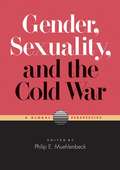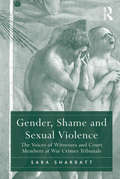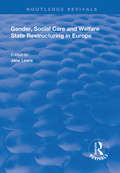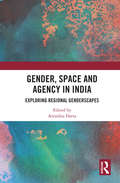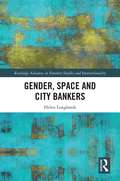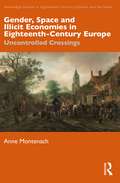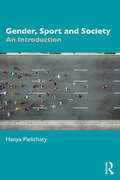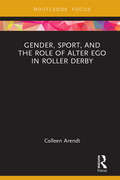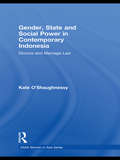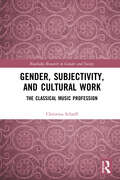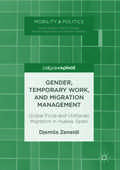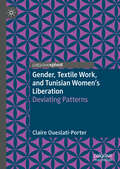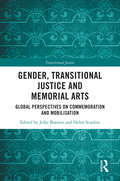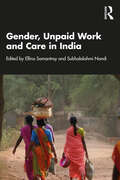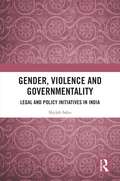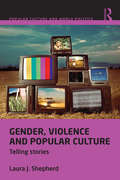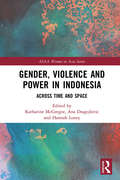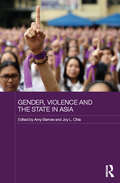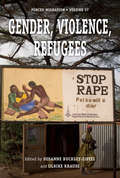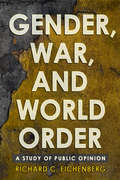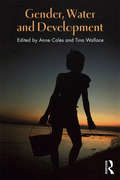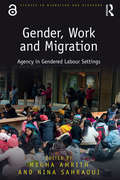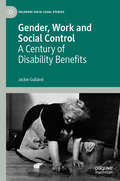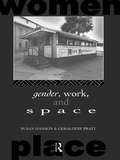- Table View
- List View
Gender, Sexuality, and the Cold War: A Global Perspective
by Philip E. MuehlenbeckAs Marko Dumančić writes in his introduction to Gender, Sexuality, and the Cold War, "despite the centrality of gender and sexuality in human relations, their scholarly study has played a secondary role in the history of the Cold War. . . . It is not an exaggeration to say that few were left unaffected by Cold War gender politics; even those who were in charge of producing, disseminating, and enforcing cultural norms were called on to live by the gender and sexuality models into which they breathed life." This underscores the importance of this volume, as here scholars tackle issues ranging from depictions of masculinity during the all-consuming space race, to the vibrant activism of Indian peasant women during this period, to the policing of sexuality inside the militaries of the world.Gender, Sexuality, and the Cold War brings together a diverse group of scholars whose combined research spans fifteen countries across five continents, claiming a place as the first volume to examine how issues of gender and sexuality impacted both the domestic and foreign policies of states, far beyond the borders of the United States, during the tumult of the Cold War.
Gender, Sexuality, and the Cold War: A Global Perspective
by Philip E. MuehlenbeckAs Marko Dumančić writes in his introduction to Gender, Sexuality, and the Cold War, "despite the centrality of gender and sexuality in human relations, their scholarly study has played a secondary role in the history of the Cold War. . . . It is not an exaggeration to say that few were left unaffected by Cold War gender politics; even those who were in charge of producing, disseminating, and enforcing cultural norms were called on to live by the gender and sexuality models into which they breathed life." This underscores the importance of this volume, as here scholars tackle issues ranging from depictions of masculinity during the all-consuming space race, to the vibrant activism of Indian peasant women during this period, to the policing of sexuality inside the militaries of the world.Gender, Sexuality, and the Cold War brings together a diverse group of scholars whose combined research spans fifteen countries across five continents, claiming a place as the first volume to examine how issues of gender and sexuality impacted both the domestic and foreign policies of states, far beyond the borders of the United States, during the tumult of the Cold War.Table of ContentsPrefaceIntroduction: Hidden in Plain Sight: The Histories of Gender and Sexuality during the Cold War Marko Dumančić Part I: SexualityFaceless and Stateless: French Occupation Policy toward Women and Children in Postwar Germany (1945-1949) Katherine RossyPatriarchy and Segregation: Policing Sexuality in US-Icelandic Military Relations Valur IngimundarsonQueering Subversives in Cold War Canada Patrizia Gentile"Nonreligious Activities": Sex, Anticommunism, and Progressive Christianity in Late Cold War Brazil Benjamin A. CowanManning the Enemy: US Perspectives on International Birthrates during the Cold War Kathleen A. Tobin Part II: FemininitiesIndian Peasant Women's Activism in a Hot Cold War Elisabeth ArmstrongThe Medicalization of Childhood in Mexico during the Early Cold War, 1945-1960 Nichole SandersAfrica's Kitchen Debate: Ghanaian Domestic Space in the Age of the Cold War Jeffrey S. AhlmanMobilizing Women? State Feminisms in Communist Czechoslovakia and Socialist Egypt May Hawas and Philip E. MuehlenbeckA Vietnamese Woman Directs the War Story: Duc Hoan, 1937-2003 Karen TurnerGlobal Feminism and Cold War Paradigms: Women's International NGOs and the United Nations, 1970-1985 Karen Garner Part III: Masculinities"Men of the World" or "Uniformed Boys"? Hegemonic Masculinity and the British Army in the Era of the Korean War Grace HuxfordYuri Gagarin and Celebrity Masculinity in Soviet Culture Erica L. Fraser
Gender, Shame and Sexual Violence: The Voices of Witnesses and Court Members at War Crimes Tribunals
by Sara SharrattDrawing on extensive interview material gathered amongst victims, witnesses, judges and NGOs, this book investigates the prosecution of rape and sexual violence in war crimes tribunals, with special attention to The International Court for the Former Yugoslavia (ICTY) and World Court in Sarajevo. It examines the testimonies of victims and witnesses and their reasons for testifying, their attitudes towards perpetrators, the consequences of testifying, their recommendations for other witnesses and conceptions of justice. In addition, it explores the attitudes of judges, prosecutors, psychologists and those in charge of protecting and offering services. Adopting a feminist approach, ’Gender, Shame and Sexual Violence’ challenges the assumption that the deterrent effect of making rape trials more visible would reduce the occurrence of sexual violence in conflict situations, contending instead that the manner in which cases are handled both increases the victims’ sense of shame and serves to propagate a representation of women's bodies that may actually serve to increase the use of sexual violence during war. A compelling analysis of the prosecution of rape as a war crime, this volume offers extensive new empirical material that will be of interest to scholars of sociology, gender studies, criminology, politics, international relations and law.
Gender, Social Care and Welfare State Restructuring in Europe (Routledge Revivals)
by Jane LewisPublished in 1998. Social provision in all European countries has faced increasing scrutiny during the 1990s. Focusing on gendered aspects of welfare state restructuring, each contributor examines the way in which the welfare state of his or her country has been restructed over the past decade, concentrating on services for elderly people and for children. Each chapter outlines the shifts in the mixed economy of welfare and describes the degree to which there has been greater decentralization moves towards a different style of public management or the introduction of market principles. The changes in the provision of services for elderly people and children is described for the same period. Finally, women's position as paid providers of services, as unpaid carers and as recipients of services is analyzed. This book investigates the idea that the move towards "marketization" in many countries is having a disproportionately detrimental effect on women whose leverage on the market tends to be weak.
Gender, Space and Agency in India: Exploring Regional Genderscapes
by Anindita DattaThis volume explores the links between gender, space and agency in India. It offers fresh perspectives and frameworks within which these links can be analysed across diverse geographical contexts in India. The essays in this volume are based on field studies which showcase how agency is gendered. It examines how gender and agency are fashioned by a multitude of everyday contexts, socio-economic processes, policy interventions, and geographic phenomenon, and manifest in — diffusion of education, decentralisation of politics, rising social inequalities, poverty, green revolution, mechanisation of agriculture, and even drought. This book will be of interest to researchers, teachers and practitioners of human geography, social and cultural geography, and those interested in geographies of gender. It will also be helpful for policy makers interested in the issues of gender and development in India.
Gender, Space and City Bankers (Routledge Advances in Feminist Studies and Intersectionality)
by Helen LonglandsGendered processes of globalisation, transnationalisation and urbanisation are increasing local and global inequalities and widening the gap between the rich and the poor. The global finance industry plays a key role in these processes, directing its operations from local command points in global cities such as London. Drawing on empirical data collected after the 2008 financial crisis – in depth interviews with male City of London bankers who are also fathers, in depth interviews with the bankers’ wives, observational data of work and family spaces, and banks’ promotional online material –this book explores the day-to-day individual and institutional social practices of wealthy City bankers and banks. The book’s analysis offers insight into how the spaces of work and home are integrally linked in ways that mutually shape, support and sustain the gendered dominance of the industry and its highly paid workers. This book will appeal to postgraduate students, researchers and academics interested in the fields of gender studies, critical studies of men and masculinities, urban and metropolitan studies, sociology, studies of globalisation and transnationalisation, anthropology, cultural studies and business management. It will also be interesting for those concerned about the role of the finance industry and neoliberal capitalist ideologies, values and practices in ever-widening local and global inequalities.
Gender, Space and Illicit Economies in Eighteenth-Century Europe: Uncontrolled Crossings (Routledge Studies in Eighteenth-Century Cultures and Societies)
by Anne MontenachThis book seeks to contribute a multi-dimensional, multi-layered and gendered approach to the illicit economy in the historiography of early modern Europe. Using original source material from several countries, this volume concentrates on a border and transnational area—approximately the Lyon-Geneva-Turin triangle—located at the heart of European trade. It focuses on three products—salt, cotton and silk—all of which fuelled the black market between the last decades of the seventeenth century and the French Revolution. This volume offers an original contribution to wider studies of smuggling, illicit markets and women’s economic roles by taking into account the economic life of remote mountain communities and industrious cities. Showing that irregular practices were a structural characteristic of early modern economies, it provides insight into the opportunities offered to women in a highly flexible economy where licit and illicit activities were intermingled in a very complex way. This research monograph is aimed at a historical audience and constitutes a useful resource for students and scholars interested in gender history, social and economic history, urban history and French studies.
Gender, Sport and Society: An Introduction
by Hanya PielichatyIntroducing the core concepts, issues and debates in the study of gender and sport, this is an accessible, engaging and thought-provoking textbook for anyone studying or interested in sport. It highlights the complexity of the gendered sporting world. Exploring inequalities in society that are reflected in sporting spaces and practices, and offering practical guidance on how to develop study skills and critical thinking, this textbook empowers readers to view the world in a different way. The book explores the social and political aspects of gender, sport and society, as well as their intersection with race/ethnicity, dis/ability, and sexualities. Introducing the basics of gender theory as applied to sport, and placing equity, diversity and inclusion at the heart of the discussion, the book explores key themes, current issues and hot topics, such as women in esports, mental health, and parenthood. The book also looks at how gender and gender stereotypes play out in the world of sport business and management. The reader is asked to co-create the textbook’s narrative by engaging with several pedagogical features, such as ‘stop and think’ and seminar activities, requesting the reader to be an active and critical participant. The compact and considered chapters will help to break down the complexity involved in this subject area. The final chapter is dedicated to study skills and practical learning advice, acting as a study guide to complement the discipline-rich chapters that come before it. This textbook is written from practitioner-educator experience ensuring the content is degree-specific, critically positioned, and most importantly, inclusive and accessible. Full of useful features in every chapter, from subject ‘insights’ to guides on further reading, media links and other sources, as well as example assignment questions, this is an indispensable textbook for all students of gender and sport, women and sport, the sporting body, sport and society, social issues in sport, inclusion in sport, and sport development, and fascinating reading for anyone with an interest in sport, gender studies or sociology more broadly.
Gender, Sport, and the Role of Alter Ego in Roller Derby (Focus on Global Gender and Sexuality)
by Colleen ArendtGender, Sport and the Role of the Alter Ego in Roller Derby focuses on the resurgence of roller derby by examining the appeal and dedication to a sport that combines the masculine aggression and physicality of sport with a more feminine, or alternative, style of organizing and community building. No longer a scripted sport filled with fake fighting and hair pulling, derby, though still dangerous, has nevertheless exploded in popularity around the world. Drawing on data from in-depth interviews with women players, Colleen Arendt reveals how derby has come to serve as a site of gender rebellion and emancipation that empowers participants. She demonstrates how players find roller derby a place to build friendships and support networks, while giving back to their community. The book also analyzes the adoption of derby personas, or alter egos, which many players use. While many players derive joy and other benefits from their derby personas, others argue that personas and alter egos detract from the athleticism and legitimacy of the sport. Finally, by considering the relationship between gender, sport, society, and power, this book tries to answer the question: Why derby? Why now?
Gender, State and Social Power in Contemporary Indonesia: Divorce and Marriage Law (ASAA Women in Asia Series)
by Kate O'ShaughnessyThis book examines gender, state and social power in Indonesia, focusing in particular on state regulation of divorce from 1965 to 2005 and its impact on women. Indonesia experienced high divorce rates in the 1950s and 1960s, followed by a remarkable decline. Already falling divorce rates were reinforced by the 1974 Marriage Law, which for the first time regulated marriage for both Muslim and non-Muslim Indonesians and restricted access to divorce. This law defined the roles of men and women in Indonesian society, vesting household leadership with husbands and the management of the household with wives. Drawing on a wide selection of primary sources, including court records, legal codes, newspaper reports, fiction, interviews and case studies, this book provides a detailed historical account of this period of important social change, exploring fully the impact and operation of state regulation of divorce, including the New Order government’s aims in enacting this legal framework, its effects in practice and how it was utilised by citizens (both men and women) to advance their own agendas. It argues that the Marriage Law was a tool of social control enacted by the New Order government in response to the social upheaval and protests experienced in the mid 1970s. However, it also shows that state power was not hegemonic: it was both contested and co-opted by citizens, with men and women enjoying different degrees of autonomy from the state. This book explores all of these issues, providing important insights on the nature of the New Order regime, social power and gender relations, both during the years of its rule and since its collapse.
Gender, Subjectivity, and Cultural Work: The Classical Music Profession (Routledge Research in Gender and Society)
by Christina ScharffWhat is it like to work as a classical musician today? How can we explain ongoing gender, racial, and class inequalities in the classical music profession? What happens when musicians become entrepreneurial and think of themselves as a product that needs to be sold and marketed? Gender, Subjectivity, and Cultural Work explores these and other questions by drawing on innovative, empirical research on the working lives of classical musicians in Germany and the UK. Indeed, Scharff examines a range of timely issues such as the gender, racial, and class inequalities that characterise the cultural and creative industries; the ways in which entrepreneurialism – as an ethos to work on and improve the self – is lived out; and the subjective experiences of precarious work in so-called ‘creative cities’. Thus, this book not only adds to our understanding of the working lives of artists and creatives, but also makes broader contributions by exploring how precarity, neoliberalism, and inequalities shape subjective experiences. Contributing to a range of contemporary debates around cultural work, Gender, Subjectivity, and Cultural Work will be of interest to scholars and students in the fields of Sociology, Gender and Cultural Studies.
Gender, Temporary Work, and Migration Management
by Djemila ZeneidiThis book delves into migration management via an original case study of a guest worker programme involving the circular migration to Spain of female Moroccan agricultural workers destined for the strawberry agri-food industry in the south. To ensure that they do return to Morocco, mothers of young children are first earmarked and then selected on the basis of their poor, rural origins and the supposed "delicacy of their hands". This book analyses the mechanisms through which migration and workforces are controlled, while also addressing the paradoxical experience of these female seasonal workers, at the intersection of domination and emancipation.
Gender, Textile Work, and Tunisian Women’s Liberation: Deviating Patterns
by Claire Oueslati-PorterThis book presents ethnographic research conducted in an export zone textile factory in Binzart, Tunisia during the years leading up to the Arab Spring. The author focuses on the sexist management tactics in the factory, as well as women workers’ patterns of resistance and capitulation to sexual objectification and exploitation. Masculinity as enacted by men and by some women is revealed as fundamental to the processes of production. Certain women workers, Oueslati-Porter shows, challenge cisgender norms by appropriating masculinity for themselves, threatening men’s masculine supremacy. Furthermore, socio-cultural surveillance mechanisms in the factory and in the family is curtail the tensions posed by the presence of masculine women.Gender, Textile Work, and Tunisian Women’s Liberation will be of interest to students andscholars of anthropology, sociology, women’s, gender, and sexuality studies, LGBTQ+ studies,and Middle East and North Africa studies.
Gender, Transitional Justice and Memorial Arts: Global Perspectives on Commemoration and Mobilization
by Jelke Boesten and Helen ScanlonThis book examines the role of post-conflict memorial arts in bringing about gender justice in transitional societies. Art and post-violence memorialisation are currently widely debated. Scholars of human rights and of commemorative arts discuss the aesthetics and politics not only of sites of commemoration, but of literature, poetry, visual arts and increasingly, film and comics. Art, memory and activism are also increasingly intertwined. But within the literature around post-conflict transitional justice and critical human rights studies, there is little questioning about what memorial arts do for gender justice, how women and men are included and represented, and how this intertwines with other questions of identity and representation, such as race and ethnicity. The book brings together research from scholars around the world who are interested in the gendered dimensions of memory-making in transitional societies. Addressing a global range of cases, including genocide, authoritarianism, civil war, electoral violence and apartheid, they consider not only the gendered commemoration of past violence, but also the possibility of producing counter-narratives that unsettle and challenge established stereotypes. Aimed at those interested in the fields of transitional justice, memory studies, post-conflict peacebuilding, human rights and gender studies, this book will appeal to academics, researchers and practitioners.
Gender, Unpaid Work and Care in India
by Ellina Samantroy and Subhalakshmi NandiThis book explores the paradox of women’s paid and unpaid work in India. It examines key themes including historical discourses, macroeconomic policies, employment trends, issues of tribal areas, public services and infrastructure, climate change and gendered migration and vulnerability of girl children. It highlights the play of gender norms, resource rights, identities and agency in women’s work. Building on feminist theoretical frameworks and empirical analyses from microstudies, the volume offers fresh perspectives for research and policy on women’s work in the Global South. A timely intervention, this multidisciplinary book will be useful to scholars and researchers of political economy, labour studies, women’s/gender studies, public policy, economics, development studies, sociology, South Asian studies and Global South studies. It will interest planners, policymakers, gender advocates, civil society organisations, human rights bodies and international organisations working towards ensuring gender equality and women’s rights.
Gender, Violence and Governmentality: Legal and Policy Initiatives in India
by Skylab SahuThis book critically examines gender-based violence in India and interrogates the legal and policy discourse surrounding it. It discusses various forms of violence faced by women such as sex selective abortion, trafficking, rape, domestic violence, as well as the violence faced by female sex workers and transgenders in India. It draws on in-depth interviews and case studies to highlight the socio-economic conditions of the survivors who find themselves forced to contend with legal and policy framework that is inadequate to deal with these issues. The author analyses the major laws against violence and the policies introduced to ameliorate the condition of survivors in order to understand the potential and challenges of these initiatives from a postmodern and feminist perspective. The book also addresses the survivors’ realisation of agency and resistance which is seen to be expressed both sporadically and on day-to-day basis. An important and timely contribution, this book will be indispensable to students and researchers of gender and sexuality, feminism, minority studies, sociology and social policy, politics, law, human rights and South Asian studies. It will also be of interest to policymakers, government agencies, think tanks and NGOs working in the area.
Gender, Violence and Popular Culture: Telling Stories (Popular Culture and World Politics)
by Laura J. ShepherdThis book examines the intersection of gender and violence in popular culture. Drawing on the latest thinking in critical international relations, media and cultural studies and gender studies, it focuses in particular on a number of popular TV shows including Angel, Buffy the Vampire Slayer, Firefly, Generation Kill, The Corner and The West Wing. The book makes a unique theoretical contribution to the ‘narrative turn’ in International Relations by illustrating the ways in which popular culture and global politics are intertwined and how we make sense of our worlds through these two frames. Methodologically, the book enhances discourse-theoretical analysis in IR through its incorporation of methods from narratology and film studies. The book proposes an aesthetic ethicopolitical approach to global politics which challenges us to interrogate how it becomes possible that we think what we think, it challenges the truths that we hold to be self-evident and that which we take to be common sense. It demands that we think carefully, critically, uncomfortably, about our world(s) – even when we’re ‘only’ watching television.
Gender, Violence and Power in Indonesia: Across Time and Space (ASAA Women in Asia Series)
by Katharine McGregor Ana Dragojlovic Hannah LoneyThis book uses an interdisciplinary approach to chart how various forms of violence – domestic, military, legal and political – are not separate instances of violence, but rather embedded in structural inequalities brought about by colonialism, occupation and state violence. The book explores both case studies of individuals and of groups to examine experiences of violence within the context of gender and structures of power in modern Indonesian history and Indonesia-related diasporas. It argues that gendered violence is particularly important to consider in this region because of its complex history of armed conflict and authoritarian rule, the diversity of people that have been affected by violence, as well as the complexity of the religious and cultural communities involved. The book focuses in particular on textual narratives of violence, visualisations of violence, commemorations of violence and the politics of care.
Gender, Violence and the State in Asia (Routledge Research on Gender in Asia Series)
by Amy Barrow and Joy L. ChiaWhile gender-based violence occurs in all societies irrespective of the level of development or cultural setting, whether in conflict or peacetime, the challenges for legal responses to gender-based violence are particularly acute in Asia. This book addresses the lack of academic discourse on gender-based violence in Asia beyond domestic violence, by demonstrating that gendered violence exists within many different contexts and is perpetuated by multiple actors. Bringing together scholars, legal practitioners and human rights advocates, the book examines the intersections between gender, violence and the state in Asian contexts. It considers the role of state institutions in perpetuating and preventing violence based on gender and identity, and thus contributes to growing scholarship around due diligence standards under international law. Analyzing both physical and structural gender-based violence, it scrutinizes how such violence exists within a landscape shaped by distinct cultural norms, laws and policies, and grapples with how to practically translate international human rights standards about state responsibility into these complex domestic environments. Contributors from diverse backgrounds draw on case studies and empirical research to ground this academic scholarship in lived experiences of individuals and their communities in Asia. By bridging the divide between policy, laws and practice to offer a unique insight into both theoretical and practical responses to how gender-based violence is understood within communities and state institutions in Asian countries, this book will appeal to students and scholars of Asian studies, Gender Studies and Law.
Gender, Violence, Refugees (Forced Migration #37)
by Susanne Buckley-Zistel Ulrike KrauseProviding nuanced accounts of how the social identities of men and women, the context of displacement and the experience or manifestation of violence interact, this collection offers conceptual analyses and in-depth case studies to illustrate how gender relations are affected by displacement, encampment and return. The essays show how these factors lead to various forms of direct, indirect and structural violence. This ranges from discussions of norms reflected in policy documents and practise, the relationship between relief structures and living conditions in camps, to forced military recruitment and forced return, and covers countries in Africa, Asia and Europe.
Gender, War, and World Order: A Study of Public Opinion (Cornell Studies in Security Affairs)
by Richard C. EichenbergMotivated by the lack of scholarly understanding of the substantial gender difference in attitudes toward the use of military force, Richard C. Eichenberg has mined a massive data set of public opinion surveys to draw new and important conclusions. By analyzing hundreds of such surveys across more than sixty countries, Gender, War, and World Order offers researchers raw data, multiple hypotheses, and three major findings.Eichenberg poses three questions of the data: Are there significant differences in the opinions of men and women on issues of national security? What differences can be discerned across issues, culture, and time? And what are the theoretical and political implications of these attitudinal differences? Within this framework, Gender, War, and World Order compares gender difference on military power, balance of power, alliances, international institutions, the acceptability of war, defense spending, defense/welfare compromises, and torture. Eichenberg concludes that the centrality of military force, violence, and war is the single most important variable affecting gender difference; that the magnitude of gender difference on security issues correlates with the economic development and level of gender equality in a society; and that the country with the most consistent gender polarization across the widest range of issues is the United States.
Gender, Water and Development (Cross-Cultural Perspectives on Women)
by Anne ColesThere is a renewed global commitment to 'water for all'. Yet even though women are usually responsible for domestic water provision, their needs and voices continue to be marginalized in the development process. A close analysis of current policy and practice shows that organizations providing improved water supplies to poor communities typically neglect the gendered nature of access to and control over water resources. The resulting gender bias causes inefficiencies and injustices in water provision and reduces the effectiveness of well-meant efforts. This book shows how, in different environmental, historical and cultural contexts, gender has been an important element in water provision. It draws on a wide range of first-hand material, analyzed from different disciplinary perspectives. Case studies include analysis of the role of water in inhibiting the fight against HIV/AIDS in southern Africa, and the challenges of taking gender into account in large water projects in India and Nepal.
Gender, Work and Migration: Agency in Gendered Labour Settings (Studies in Migration and Diaspora)
by Megha Amrith Nina SahraouiWhile the feminisation of transnational migrant labour is now a firmly ingrained feature of the contemporary global economy, the specific experiences and understandings of labour in a range of gendered sectors of global and regional labour markets still require comparative and ethnographic attention. This book adopts a particular focus on migrants employed in sectors of the economy that are typically regarded as marginal or precarious – domestic work and care work in private homes and institutional settings, cleaning work in hospitals, call centre labour, informal trade – with the goal of understanding the aspirations and mobilities of migrants and their families across generations in relation to questions of gender and labour. Bringing together rich, fieldwork-based case studies on the experiences of migrants from the Philippines, Bolivia, Ecuador, Zimbabwe, Mozambique, Mauritius, Brazil and India, among others, who live and work in countries within Europe, Asia, the Middle East and South America, Gender, Work and Migration goes beyond a unique focus on migration to explore the implications of gendered labour patterns for migrants’ empowerment and experiences of social mobility and immobility, their transnational involvement, and wider familial and social relationships.
Gender, Work and Social Control: A Century of Disability Benefits (Palgrave Socio-Legal Studies)
by Jackie GullandThis book uses previously unknown archive materials to explore the meaning of the term ‘incapable of work’ over a hundred years (1911–present). Nowadays, people claiming disability benefits must undergo medical tests to assess whether or not they are capable of work. Media reports and high profile campaigns highlight the problems with this system and question whether the process is fair. These debates are not new and, in this book, Jackie Gulland looks at similar questions about how to assess people’s capacity for work from the beginning of the welfare state in the early 20th century. Amongst many subject areas, she explores women’s roles in the domestic sphere and how these were used to consider their capacity for work in the labour market. The book concludes that incapacity benefit decision making is really about work: what work is, what it is not, who should do it, who should be compensated when work does not provide a sufficient income and who should be exempted from any requirement to look for it.
Gender, Work and Space (Routledge International Studies of Women and Place)
by Susan Hanson Geraldine PrattGender, Work and Space explores how social boundaries are constructed between women and men, and among women living in different places. Focusing on work, the segregation of men and women into different occupations, and variations in women's work experiences in different parts of the city, the authors argue that these differences are grounded, constituted in and through, space, place, and situated social networks.The sheer range and depth of this extraordinary study throws new light on the construction of social, geographic, economic, and symbolic boundaries in ordinary lives.
